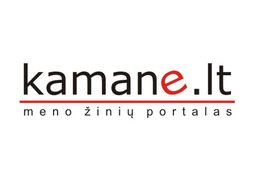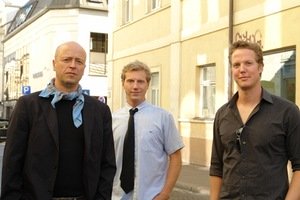MAKERS OF "THE INVISIBLE FRONT" AIM TO SHOW THE LITHUANIAN AFTERWAR HISTORY TO THE WORLD 1
In brief: Film “The Invisible Front”, premièred in Kaunas “Romuva” cinema on the 4th of September, was a possibility for Lithuanians to look at themselves from outside because the grievances of Lithuanian history were contemplated by foreigners here. It was a fair challenge to the creative team to speak about the problems of another country. Both directors are related to Lithuania very closely (Swede Jonas Ohman has been living here for almost a decade and Vincas Sruoginis is a Lithuanian American) but the latter admits he thought the film would be booed in Lithuania.
However, the film was accepted with a great applause in Kaunas and there were reasons for that. The story, based on the recollections of the famous partisan leader Juozas Daumantas-Lukša, revealed the tragedy of guerrilla fights and the courage of partisans. J. Ohman claims he respects Lithuanians a lot but it seems like they are waiting for someone to save them. In his opinion, the Lithuanian people need to understand who they are and this is impossible without perceiving the history.
Charmed by the extraordinary story, the creators worked with the help of their friends and families and funded their travels across Europe and Lithuania themselves. The American film producer Mark Johnston stated that the film’s financial value could not be expressed in figures because visual effects and post-production had been executed by the best New York companies. Many people who supported the film were inspired by the topic of fight for the independence since it was important in the American history too.
Another source of support was the internet site Kickstarter.com, which goal is to help make creative projects and bring financial sources together. The film was also partially sponsored by the Culture Support Fund and Ministry of National Defence of Lithuania.
“I think that the most important thing in the totalitarian society is secrecy, like a night-time when you cannot see anything. When Lithuanians went to streets in the 90’s, the totalitarian structures had to understand they lost the control. Lithuanians became visible and brought their risky ideas into the day light”, – J. Ohman said.
The authors wish this story to be seen in Western countries too. There are plans to show the film in South and North Americas, Asia, Eastern and Western Europe and to translate it in as many languages as possible. They also hope to expand the film’s internet website Theinvisiblefront.com where true Lithuanian stories from that period and other data could be found.
During the film première authors had to stress out that the story was not that deep and thorough as it could be because it was dedicated to a Western spectator with no clue about the Lithuanian history. However, the makers mention to have more plans related to the Lithuanian history: J. Ohman says he has taken interests in the whole period of occupation, for instance, Romas Kalanta’s story.
Hopefully, this and next year the film will visit film festivals in Europe and the USA. Later it should return to Lithuania.









